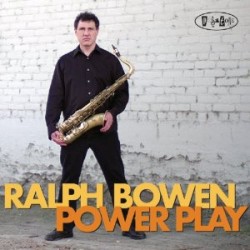saxshed.com
Saxophonist Ralph Bowen steps out once again on Posi-Tone Records with his newest release Power Play. The quartet features Orrin Evans on piano, Kenny Davis on bass and Donald Edwards on drums and Bowen on tenor saxophone.
I have written before that I have been a huge fan of Ralph Bowen’s since first hearing him play with the 80s jazz group OTB (Out of the Blue). I have followed his impressive career as a sideman and leader and briefly elected to study with him at one point. Hearing Ralph Bowen again on his newest release rekindles my longtime admiration for his musicianship and ability as a saxophonist.
Bowen composes eight of the nine cuts here on Power Play. (Street date Feb. 8, 2011) He opens with the energetic K.D.’s Blues. Bowen’s sound and solo phrases never disappoint the listener. As he stretches out deep into the choruses, you can hear his ever-present stellar technique. At times he seemingly pays homage to Coltrane and the “sheets of sound” approach.
As a long time fan of Ralph Bowen’s playing, many of us have heard his brilliant tenor sound as well as pristine solo flute playing. (I believe he received a master’s degree in flute performance as well). What I was not prepared for was Mr. Bowen to be playing alto saxophone on Drumheller Valley. Wow. Listen for yourself. He has a whole other voice on the alto, equally as compelling as his tenor playing – and the alto players thought they were safe…
The brisk-paced Two-Line Pass and similar The Good Sheppard find Ralph Bowen back at home on tenor. Evans, Davis and Edwards drive hard and swing harder behind Bowen on Two-Line Pass. His stream of eighth notes, glissandos and brief excursions into the altissimo once again show off his plentiful talents. The tenor and piano trade with Edward’s drums, ever increasing the intensity until the final short melodic statement. Bowen demonstrates more surgical precision with his initial choruses on The Good Sheppard and gradual explores the outer limits via extended techniques such as multiphonics and growls.
My One and Only Love, the only standard recorded on Power Play, shows off the sensitivity of the trio behind Bowen’s captivating playing. His tenor sound has changed slightly, yet noticeably over the years. It seems a tad darker and has mellowed like a fine wine. Despite his proficiency on the instrument, he demonstrates great restraint on the final cadenza and his simple, implied D/C harmonic consideration.
Bella Firenze possesses a bit of a jazz/waltz feel, despite its 4/4 meter. They are light and nimble here where elsewhere on the recording the playing has been more intense. The contrast is attractive and makes for nice programming on the cd. Evans plays a lovely solo on piano followed by Bowen’s initially waning and then well-developed tenor solo. The fade out at the end features some particularly inspired playing that somewhat deviates from the lighter feeling at the onset of Bella Firenze.
Ralph Bowen’s soprano saxophone playing is another unexpected treat on Jessica. As on alto and tenor, Bowen’s sounds completely at home in this instrument. He weaves and winds his way through the instrument, creating a sonic. It is notable that Kenny Davis gets a chance to stretch out a bit on acoustic bass here as well.
Walleye Jigging, likely named for Bowen’s love of the outdoors, showcases another side of the ensemble. Donald Edwards wonderful drumming and particularly his use of cymbals should not be overlooked on this recording and especially on this tune.
Sweet and tender is A Solar Romance, which is also Power Play’s final cut. Bowen returns to his voice on soprano sax. The group demonstrates the use of space a key points throughout the tune, proving they can play tempos, take it out and lay back all at the same time.
Did I mention I’m a fan of Ralph Bowen? Run; do not walk to buy this Cd on Feb. 8, 2011.


 Ralph Bowen: Due Reverence (Positone PR8061)
Ralph Bowen: Due Reverence (Positone PR8061)